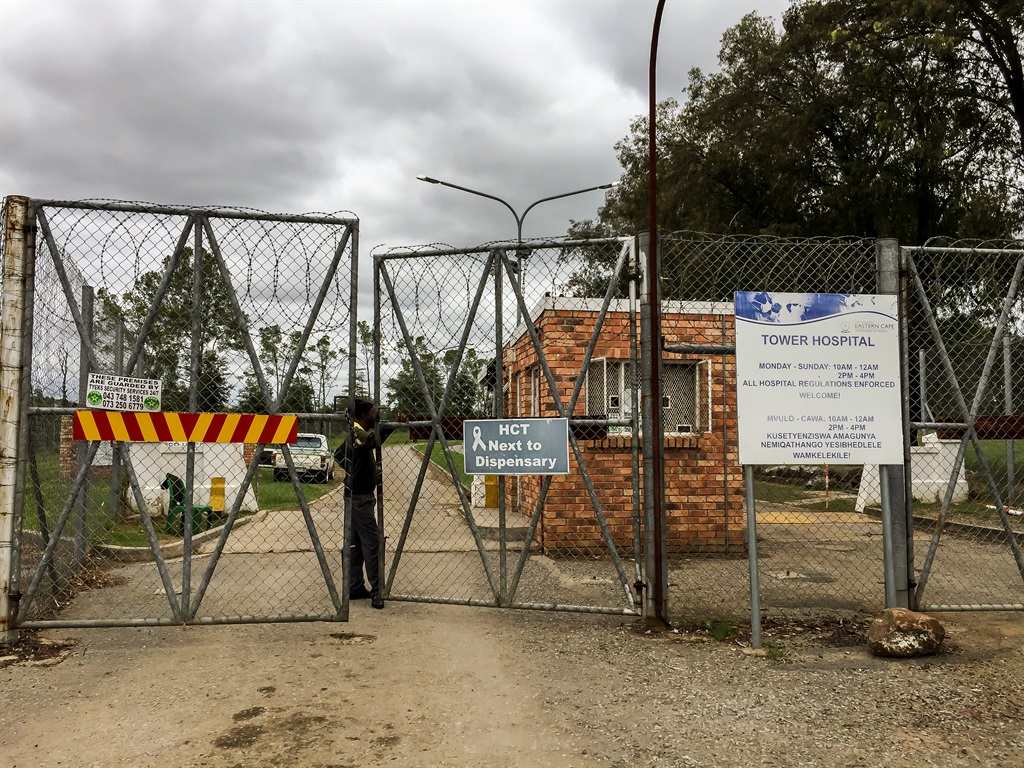
It was supposed to be a place where mentally ill people would have quality, long-term care under the supervision of qualified staff.
But at Tower Hospital in the Eastern Cape, patients’ rights have been violated, there is a shortage of staff, incorrect records of deaths and medical records, and solitary confinement areas pose risks to mentally ill patients.
These are some of the findings by the South African Society of Psychiatry during a recent visit to the hospital.
The society has urged the health department to urgently investigate the situation at Tower Hospital, and to include the entire mental healthcare system in the Eastern Cape, to prevent more violations of patient’s rights.
The report followed on the complaints received from Dr Kiran Sukeri, a sessional psychiatrist at the hospital.
The society of psychiatry, the Treatment Action Campaign, and members of the South African Federation of Mental Health visited the hospital on March 6.
Although certain limitations of the one-day visit led to only evidence presented on the day to be considered, the findings were of such a nature that Professor Bernard Janse van Rensburg, the president of the society of psychiatry, said there was little doubt that significant problems existed for some time in terms of the running of the hospital.
“Although management identified difficulties in the smooth running of the institution, no effective strategies have ever been employed to address or solve the challenges and on at least two occasions the problems were of such nature that it required the intervention of the Eastern Cape health department,” he said.
“Patient and death records, death notification, as well as the manner and capacity of secluding patients at this facility has been infringing on patients’ human rights.”
Read: Eastern Cape’s ticking psychiatric time bomb
After he resigned, Sukeri said he could no longer “remain silent” about the treatment of patients at the institution.
Janse van Rensburg said that the 400-bed long-term psychiatric hospital in the central part of the Eastern Cape has been utilised for many years as a non-voluntary, inpatient facility for patients with serious mental conditions and required long-term care from across the province.
“However, there has been no development in the province that could have facilitated the implementation of the appropriate de-institutionalisation of patients to be treated in a least restrictive community-based environment close to their homes. To make matters worse the staff shortages of only two medical offices on the floor at Tower Hospital is infringing on the physical health of patients.”
Sukeri alleged that a far greater number of people had recently died at the hospital than the government was officially admitting.
Reports in the Eastern Cape daily, The Herald, the Eastern Cape health department was quoted as saying that 25 patients died at Tower Hospital between 2012 and 2017.
Sukeri said that the hospital’s death register recently “disappeared” and was replaced with a new one.
He showed City Press’s sister publication Rapport copies of the “lost” register indicating at least 90 patients died at the institution since 2010 and four patients died in January alone.
He added that only two of the four deaths in January were signed off by a medical doctor.
Janse van Rensburg said accurate record-keeping and proper documentation was a considerable challenge at Tower Hospital.
“Significant discrepancies and inaccuracies exist about the hospital’s available information on the number and nature of deaths of inpatients that have occurred over the last five to eight years. This has led to important records not being recorded or stored properly and reported instances where recording of information relating to deaths or patient care has been done retrospectively instead of at the point of occurrence.
“It is unclear whether this was done as an attempt to give an impression of lower death rates or better care. What is clear is the fact that the system of record keeping and storing of important records has not been done effectively over many years and has left the care of patients at risk. In addition, the institution and health professionals who work there are now also vulnerable to litigation.”
Solitary confinement abused
Sukeri also claimed that some patients were sometimes kept in solitary confinement with just a bucket for a toilet if they become “restless”. Psychiatric guidelines stipulate that a patient may never be kept in solitary confinement for more than four hours.
He also claimed that a patient who was last month locked up in solitary confinement panicked, wrapped his legs in a sheet and set himself on fire.
It was also found that the physical state of the seclusion rooms at the hospital posed a particular risk and it was recommended that the use of these spaces to seclude patients should be stopped immediately. There was also inadequate implementation of existing policies and procedures to ensure the safe and legal seclusion of mental healthcare users.
“The seclusion rooms are positioned in the courtyard of the hospital, far away from the nurses’ station or other points of observation by staff, with no amenities available, and seem to have already been precipitating incidents of harm to and human rights abuses of patients.”
Long-term systemic failures
Janse van Rensburg said that although hospital personnel of all categories, including senior management, largely seemed to have goodwill towards patients and patient-care, there seemed to be a limited understanding (especially at senior management level), of how long-standing systemic failures and inadequacy of actions taken to address these failures, have exacerbated the situation and affected patient rights.
“Such systemic failures seem to have aligned with individual factors within the senior management team of the hospital [communication challenges, flouting of standing protocol and procedure with minimal consequences, poor conflict resolution, lack of proactive management] to create a perfect storm. This seems to have resulted in the crisis that has manifested in Tower Hospital.”
The report included 15 recommendations across policy and procedure, food and clothing, physical health of patients, death registration and notification and advocacy.
The findings along with recommendations have been shared with the Eastern Cape health department, which employed a task team to investigate the incidences at Tower Hospital.
The report is said to be released next week.




 Publications
Publications
 Partners
Partners








